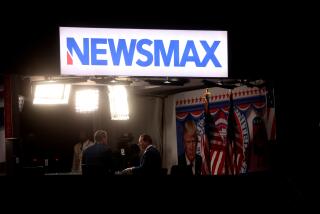ABC’s Ad Rate Hikes Prove a Hard Sell
With television’s annual sale of prime-time commercial spots winding down, some networks -- including Walt Disney Co.’s ABC -- have dug in their heels.
ABC’s tough negotiating stance is particularly irksome to advertisers. Though some are biting, others complain that ABC’s recent performance doesn’t justify its demands for rate increases of 5% to 6%.
The network’s ratings during the recently completed season plunged 16% among the viewers that advertisers pay the most to reach: those 18 to 49 years old.
But ABC, apparently, won’t budge. Disney President Robert Iger said last week that the network might even pull off the market some of its prime-time commercial inventory during the so-called upfront sales period and take its chances later in the year.
According to advertisers, that would be a high-stakes gamble for fourth-placed ABC.
“It’s a double-edged risk,” said Brad Adgate, research director for advertising buying firm Horizon Media.
“They’re betting that the marketplace will be strong, and that their shows click with viewers” this fall, drawing advertisers in then.
ABC’s ad sales slowed last week as buyers balked at the network’s prices. It has sold more than half of its prime-time inventory but probably will fall short of the $1.7 billion it garnered during the 2003 upfront market, the period in late May and early June when the networks typically sell more than three-quarters of their prime-time commercial spots for the coming season.
“It will be a decent upfront for ABC, not as strong as last year, but certainly decent,” Iger said at a Deutsche Bank Securities media conference. “We’re looking at ... somewhere in the $1.5- to $1.6-billion range.” That didn’t include, Iger pointed out, $500 million in expected ad revenue next season for commercial spots during “Monday Night Football,” the NBA playoffs, the Academy Awards and other special events.
ABC isn’t the only network unable to sell all its prime-time ads now at the rates it wants. But a bigger bounty later on isn’t necessarily guaranteed, because there could end up being a glut of available spots for the season that begins in September.
As television’s rite of spring, the annual sale of prime-time commercial spots is a closely watched barometer for the overall health of the advertising industry and media conglomerates that own networks. During last year’s upfront, they sold a record $9.3 billion in prime-time spots.
Viacom Inc.’s CBS, the only major network whose audience grew last season, entered the upfront market in the strongest position of any of the networks. Advertisers say CBS has the most stable lineup and a promising crop of new shows, including the Jerry Bruckheimer-produced “CSI: New York.”
And like ABC, CBS has been holding out for rate hikes -- of nearly 10%. As of Friday, network sources said, CBS had sold more than half of its inventory. Analysts have predicted that CBS will come away with about $2.4 billion.
Viacom’s UPN, a source said, should finish with about $300 million in sales, up from last year’s $250 million.
General Electric Co.’s NBC completed its sales by hauling in $2.9 billion, about even with last year. Despite a 4% decline in prime-time audience, NBC won rate hikes of about 7%.
“We’re very pleased,” said Randy Falco, president of NBC Universal Television Networks Group. “We’ve maintained our dominance on Thursday nights, the most important night on television. And we’re still 30% higher than our nearest competitors overall in prime time.”
Fox Broadcasting Co., owned by Rupert Murdoch’s News Corp., hit its targets by pulling in 7% to 8% rate increases. Fox finished with $1.6 billion, flat from last year. Fox’s take is usually less than its rivals’ because it sells just 15 hours a week in prime time, reserving the 10 o’clock hour for local news. By comparison, NBC, CBS and ABC all program 22 hours of prime time a week.
And after a disappointing season in which it lost more than 10% of its viewers, the WB network reeled in $675 million in advance sales, down from the $700 million that it collected last year. The WB is owned by Time Warner Inc. and Tribune Co., which also publishes the Los Angeles Times.
Despite its lower ratings, the WB still wrangled rate increases of 7% to 8%.
“We deliver that young audience that advertisers want,” said Bill Morningstar, the network’s ad sales chief.
“And although we experienced a bump in the road last season, advertisers know our track record.”
More to Read
The biggest entertainment stories
Get our big stories about Hollywood, film, television, music, arts, culture and more right in your inbox as soon as they publish.
You may occasionally receive promotional content from the Los Angeles Times.











